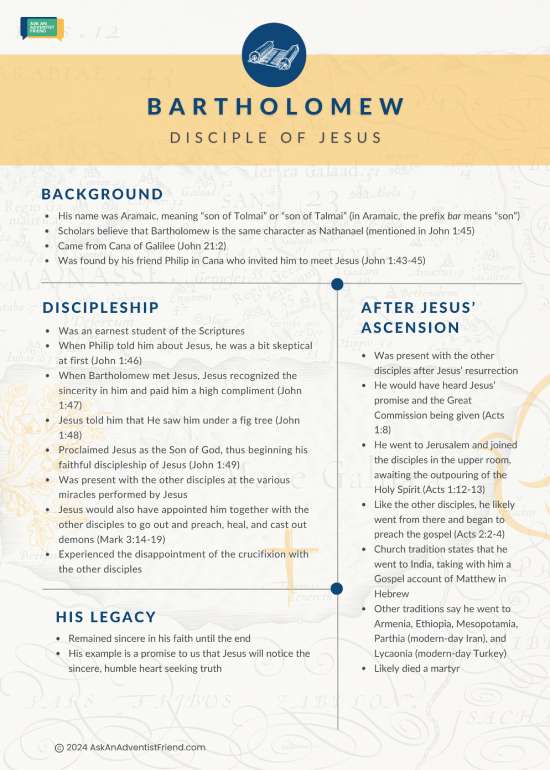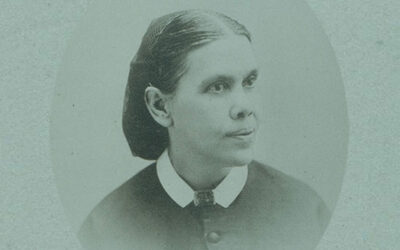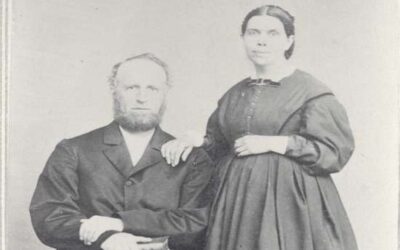 Bartholomew is a lesser-known character in the New Testament who is mentioned in each of the lists of the twelve disciples of Jesus Christ (Matthew 10:2-4; Mark 3:14-19; Luke 6:13-16). He is most likely the same individual as Nathanael (see John 1), someone who was sincerely studying the Scriptures and waiting for the Messiah to come.
Bartholomew is a lesser-known character in the New Testament who is mentioned in each of the lists of the twelve disciples of Jesus Christ (Matthew 10:2-4; Mark 3:14-19; Luke 6:13-16). He is most likely the same individual as Nathanael (see John 1), someone who was sincerely studying the Scriptures and waiting for the Messiah to come.
His wait was no doubt rewarded when Jesus appointed him as one of the twelve, and he had the opportunity to witness the Messiah’s healing, teaching, and preaching ministry. He also experienced the outpouring of the Holy Spirit at Pentecost, spurring his work as a missionary for Jesus.
So, let’s dig deeper into what the Bible and historical Christian traditions can teach us about Bartholomew. We’ll cover:
Bartholomew’s background
The first we read about Bartholomew is in Matthew 10:2-4:
“The names of the twelve apostles are these: first, Simon, who is called Peter, and Andrew his brother; James the son of Zebedee, and John his brother; Philip and Bartholomew; Thomas and Matthew the tax collector; James the son of Alphaeus, and Thaddaeus; Simon the Zealot, and Judas Iscariot, who betrayed him” (ESV).
The name Bartholomew gives us hints about his lineage. Bartholomew is Aramaic, meaning “son of Tolmai” or “son of Talmai” (in Aramaic, bar means “son”).1
Scholars believe that Bartholomew is the same character as Nathanael (mentioned in John 1:45). Here’s what Bible commentators say about it:
“Nathanael was probably his own personal name. The Synoptic Gospels [Matthew, Mark, and Luke] make no mention of Nathanael, and the Gospel of John says nothing of Bartholomew. John mentions Nathanael, together with others of the Twelve, in a setting where it seems that none but disciples of the inner circle of Twelve were present (see ch. 21:2). Thus there is no valid reason for doubting that the two names Bartholomew and Nathanael refer to the same person.”2
In this case, Bartholomew was likely his family name, and Nathanael, his first name. And this makes sense, since it wasn’t uncommon for Jews in the first century to have two names.
According to John 21:2, he came from Cana of Galilee. And it’s there that his friend Philip found him and invited him to meet Jesus (John 1:43-45).
Bartholomew’s discipleship

Image by Gerd Altmann from Pixabay
Bartholomew is mentioned only a handful of times in the Gospel accounts. Still, because he was part of the twelve disciples, he would’ve been with them through many key events of Jesus’ ministry, such as the feeding of the 5,000, Jesus’ healing miracles, and the crucifixion.
Jesus would also have appointed him together with the other disciples to go out and preach, heal, and cast out demons (Mark 3:14-19).
The most we know about Bartholomew, though, comes from his first encounter with Jesus.
The account gives us evidence of a close connection between Bartholomew and Philip, the disciple who invited him to meet Jesus. Interestingly, Bartholomew is also always listed right after Philip when the disciples are named in the Bible (Matthew 10:2-4; Mark 3:14-19; Luke 6:13-16).
When Philip found Bartholomew, he exclaimed:
“We have found him of whom Moses in the Law and also the prophets wrote, Jesus of Nazareth, the son of Joseph” (John 1:45, ESV).
This tells us that both Philip and Bartholomew were earnest students of the Scriptures. They were eager for the promised Messiah of the Old Testament.
And yet, Bartholomew was a bit skeptical: “Can anything good come out of Nazareth?” (John 1:46, ESV).
Rather than arguing with him, Philip simply invited him to come and see (John 1:47). And so, Bartholomew did.
He wasn’t disappointed.
When Jesus saw Bartholomew coming toward Him, He said, “Behold, an Israelite indeed, in whom there is no deceit!” (John 1:47, ESV).
What a high compliment! Jesus recognized the sincerity in him. Bible commentators note:
“Nathanael was one of that small but devout group who earnestly waited for ‘the consolation of Israel’ (see Luke 2:25) and aspired to the high ideals set before them by God.”3
Bartholomew was taken aback. “How do You know me?” he asked (John 1:48, NKJV).
Jesus responded, “Before Philip called you, when you were under the fig tree, I saw you” (John 1:48, NKJV).
Jesus had taken notice of Bartholomew’s sincere longing for the Messiah. He knew him inside and out. This realization made Bartholomew exclaim:
“Rabbi, You are the Son of God! You are the King of Israel” (John 1:49, ESV).
And so began his faithful discipleship with Jesus. Though he would experience the disappointment of the crucifixion with the other disciples, he would emerge courageous and hopeful, empowered by the Holy Spirit.
Bartholomew’s life after Jesus’ ascension

Photo by Amaury Gutierrez on Unsplash
Bartholomew was there with the other disciples (except Judas) after Jesus’ resurrection. He would’ve heard Jesus’ promise and commission: “But you will receive power when the Holy Spirit has come upon you, and you will be My witnesses in all Judea and Samaria, and to the end of the earth” (Acts 1:8, ESV).
Together with the other disciples, Bartholomew took those words to heart.
Acts 1:12-13 records that he went to Jerusalem and joined the disciples in the upper room. There, they prayed and waited for the outpouring of the Holy Spirit.
Acts 2 tells us the revolutionary results of those prayers. The disciples received the Holy Spirit “like a rushing mighty wind,” and began to preach the good news of Jesus (verse 1, NKJV). All their fears were quieted, and they boldly shared about the one they loved.
Though we don’t know the details, we can assume that Bartholomew, like the other disciples, went from there and began to preach the gospel.
According to a tradition taught by the church father Eusebius of Caesarea, Bartholomew went to India, taking with him a gospel account of Matthew in Hebrew.4
Other traditions say he went to Armenia, Ethiopia, Mesopotamia, Parthia (modern-day Iran), and Lycaonia (modern-day Turkey).5
Again, the Bible and history don’t tell us for sure, but it’s most likely that he died a martyr for his faith.
Here’s what Foxe’s Book of Martyrs says about Bartholomew’s death:
“Preached in several countries, and having translated the Gospel of Matthew into the language of India, he propagated it in that country. He was at length cruelly beaten and then crucified by the impatient idolaters.”6
Bartholomew remained sincere in his faith to the end—leaving an example for us.
Bartholomew’s legacy

Photo by Fa Barboza on Unsplash
We may not know much about Bartholomew—his life before following Christ, his time as a disciple, or his accomplishments as an apostle—but what we do know about him leaves us a beautiful legacy.
He shows us what it looks like to have a heart sincerely seeking truth.
Bartholomew was searching the Scriptures, wanting to be led by the Holy Spirit, wanting to see the Messiah. And Jesus took notice, commending him.
His simple faith guided his journey as a disciple and later a missionary sharing the gospel. And his possible martyrdom means that he was making enough of a difference for Jesus that people would have taken notice.
But above all, Bartholomew’s example is a promise to us that Jesus indeed notices those who seek Him in sincerity and humility.
Because in the end, regardless of our life accomplishments, it’s our relationship with Jesus that truly matters.
Want to learn more about the other disciples of Jesus? See what they were like and how Jesus led each one of them.
Related pages
- Metzger, Bruce, and Coogan, Michael, ed., The Oxford Companion to the Bible, pp. 75, 45. [↵]
- Seventh-day Adventist Bible Commentary, vol. 5, comment on Mark 3:18. [↵]
- Ibid., vol. 5, comment on John 1:47. [↵]
- “Saint Bartholomew,” Encyclopedia Britannica. [↵]
- Ibid. [↵]
- Foxe, John, Foxe’s Book of Martyrs, chapter 1. [↵]
More Answers
What Is an Adventist Medical Missionary?
A medical missionary in the Adventist Church is someone who cares for the medical needs of people as a way of showing the love of Jesus. They may travel to another country, or even just serve in their hometown.
Is the Seventh-day Adventist Church Protestant?
With so many Christian denominations, it can be hard to keep track of which ones share which beliefs. Let’s look at the core Protestant beliefs of Adventism.
The True Events Surrounding the Birth of Jesus
Jesus’ birth involved many strange events: a pregnant virgin, a stable birth, angels appearing to shepherds, and wealthy visitors. These help us understand His supernatural yet incredibly humble life.
Are Seventh-day Adventists Evangelicals?
According to its origins and definition, evangelicalism is about following Jesus and the Bible and sharing the Gospel through the way we live our lives. Adventists wholeheartedly harmonize with these principles.
Could Anything Keep Me from Becoming an Adventist?
We are each saved through Christ. But when it comes to church membership, are there certain beliefs or expectations to become an Adventist?
Do Seventh-day Adventists Have “Rules”?
We uphold principles we believe will help us maintain a closer relationship with Jesus and His Word. Learn how these principles guide Adventist lifestyles.
Your Comprehensive List of Ellen G. White’s Visions
Ellen White—an author, health-reform advocate, Bible scholar, and one of the most influential founding figures of the Seventh-day Adventist Church—was blessed by the Holy Spirit with the spiritual gift of prophecy (1 Corinthians 14; Romans 12:6-8). During her lifetime, she received direct guidance and inspiration from God in several different ways.
Do Seventh-day Adventists Have “Rules” For Marriage?
Around the world, many cultures and religions have various marriage traditions, expectations, or even rules when it comes to choosing a partner, planning the wedding, extended family logistics, or a number of other things.
An In-Depth List of the Prophecies About Jesus
How many prophecies of Jesus are in the Old Testament?
Can a Seventh-day Adventist Marry a Non-Adventist?
Yes. Seventh-day Adventists are not under any official rules that dictate who they can or cannot marry. This is a personal, life-altering decision between the couple and God.
What Adventists Believe About Alcohol and Tobacco Use
The Seventh-day Adventist Church has historically discouraged the use of alcohol and tobacco. Even before the church started in 1863, its leaders were realizing the negative effects of these substances.
What Does the Bible Say About Aliens and UFOs?
In 1938, aliens and UFOs were the subject of a mass prank. Around Halloween, Orson Welles performed a radio adaptation of H.G. Wells’ War of the Worlds. This ended up causing a panic throughout the United States—many people took it to mean that aliens had really attacked New Jersey.
What Do Adventists Believe About the Authority of the Bible?
Learn how one really old book (the Bible) is the sole foundation for all Seventh-day Adventist beliefs.
Is the Soul Immortal? Exploring What Adventists Believe
Based on the way the Bible describes humanity in comparison to God and angels, Seventh-day Adventists believe souls are not something you have, but something you are.
Jewelry—Why Do Many Seventh-day Adventists Choose Not to Wear It?
If you walk into a Seventh-day Adventist church service, you might notice that many people aren’t wearing earrings, bracelets, necklaces, or sometimes even wedding rings.
How the Bible Defines Love
Everyone talks about it, but do we really know what it means?
Why Does God Allow Suffering?
Poverty, genocide, a school shooting. A tsunami or earthquake that wipes out thousands of lives and leaves behind mourning family members.
International Pathfinder Camporee
Youth aged 10-15 in the Adventist Church’s global Pathfinder program look forward to the International Camporee every 5 years. This event brings together Pathfinders from around the world for exciting activities.
What Is Peter’s Ladder of Virtues, and How Does It Work?
Peter’s ladder of virtues is a phrase that refers to eight characteristics to be developed as a person grows in their relationship with Jesus Christ. It can be found in 2 Peter 1.
How Adventists interpret Bible prophecy
Bible prophecy conjures up a variety of emotions in people. For some, it feels exciting or mysterious.
What Counts as “Work” on the Sabbath?
God designed the Sabbath day to be a 24-hour period when we could pause and enjoy the goodness of His creation. We do this by putting aside our regular work so we can focus on spending time with Him and appreciating what He’s created (Exodus 20:8-11).
Moviegoers’ Guide to The Hopeful: The Facts Behind the Film
Learn where and when you can watch The Hopeful and how to get tickets. Already seen it? We’ll uncover the real story that inspired this film.
Protestant Reformation
Martin Luther. The 95 Theses. The Reformation. The Protest. Maybe you’ve heard these terms and wondered, What’s the big deal?
Ellen G. White’s Lasting Legacy
Ellen G. White is a well-known name among Seventh-day Adventists, but she also made an impact in many other parts of history, aside from being a co-founder of the Adventist Church.
Ellen G. White’s Challenging Health Journey
When it comes to lifelong struggles with health, Ellen White is no stranger. In fact, health challenges set the tone for her life early on—years before she was involved in co-founding the Seventh-day Adventist Church.
“What Was Ellen and James White’s Marriage Like?”
Ellen and James White, cofounders of the Seventh-day Adventist Church, met and married under somewhat unusual circumstances. But it’s a sweet story of partners in ministry becoming partners in life. And their married life continued to center on furthering the spread of the gospel together.
What Do Adventists Believe About the Mark of the Beast and 666?
It’s a popular topic, especially during tumultuous times. When everything around you feels chaotic, it’s easy to wonder about the end of the world, and topics like the mark of the beast, as mentioned in Revelation 13, can stir up uneasiness.
What is the Ellen G. White Estate?
What is the Ellen G. White Estate?Ellen G. White’s contributions to the formation and growth of the Seventh-day Adventist Church are an integral part of its history. As a significant co-founder of the denomination, her writings provided millions of people with...
Getting to Know Mark—Gospel Writer and Follower of Jesus
Mark (whose full name was John Mark) had a lot of roles in the New Testament: he was an early follower of Jesus Christ, he traveled the Mediterranean as a Christian missionary, and he wrote a book of the Bible.
Didn’t find your answer? Ask us!
We understand your concern of having questions but not knowing who to ask—we’ve felt it ourselves. When you’re ready to learn more about Adventists, send us a question! We know a thing or two about Adventists.
































